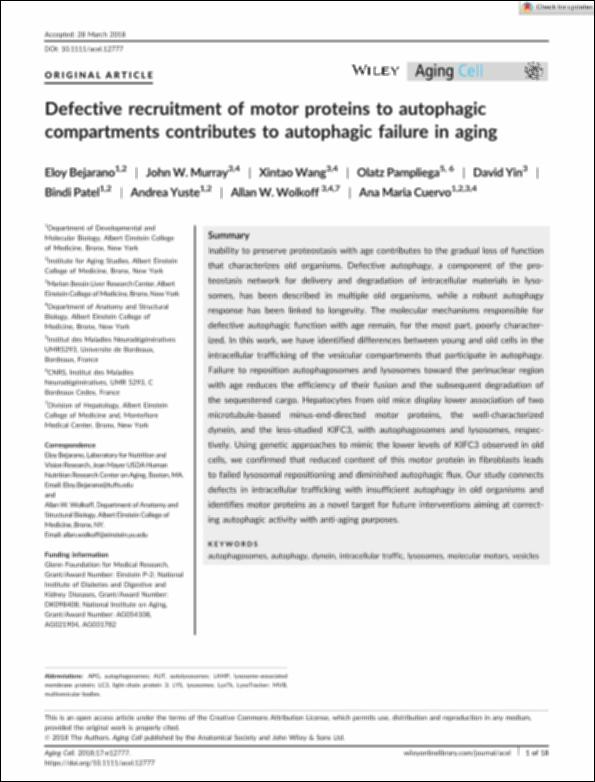Por favor, use este identificador para citar o enlazar este ítem:
http://hdl.handle.net/10637/15193Defective recruitment of motor proteins to autophagic compartments contributes to autophagic failure in aging
| Título : | Defective recruitment of motor proteins to autophagic compartments contributes to autophagic failure in aging |
| Autor : | Bejarano Fernández, Eloy Murray, John W. Wang, Xintao Pampliega, Olatz Yin, David Patel, Bindi Yuste Rivero, Andrea Wolkoff, Allan W. Cuervo, Ana María |
| Materias: | Célula; Cells; Lisosomas; Lysosomes; Envejecimiento; Aging |
| Editorial : | John Wiley & Sons |
| Citación : | Bejarano, E., Murray, J.W., Wang, X., Pampliega, O., Yin, D., Patel, B., Yuste, A., Wolkoff, A.W. & Cuervo, A.M. (2018). Defective recruitment of motor proteins to autophagic compartments contributes to autophagic failure in aging. Aging Cell, vol. 17, i. 4 (aug.), art. e12777. DOI: https://doi.org/10.1111/acel.12777 |
| Resumen : | Inability to preserve proteostasis with age contributes to the gradual loss of function that characterizes old organisms. Defective autophagy, a component of the proteostasis network for delivery and degradation of intracellular materials in lysosomes, has been described in multiple old organisms, while a robust autophagy response has been linked to longevity. The molecular mechanisms responsible for defective autophagic function with age remain, for the most part, poorly characterized. In this work, we have identified differences between young and old cells in the intracellular trafficking of the vesicular compartments that participate in autophagy. Failure to reposition autophagosomes and lysosomes toward the perinuclear region with age reduces the efficiency of their fusion and the subsequent degradation of the sequestered cargo. Hepatocytes from old mice display lower association of two microtubule-based minus-end-directed motor proteins, the well-characterized dynein, and the less-studied KIFC3, with autophagosomes and lysosomes, respectively. Using genetic approaches to mimic the lower levels of KIFC3 observed in old cells, we confirmed that reduced content of this motor protein in fibroblasts leads to failed lysosomal repositioning and diminished autophagic flux. Our study connects defects in intracellular trafficking with insufficient autophagy in old organisms and identifies motor proteins as a novel target for future interventions aiming at correcting autophagic activity with anti-aging purposes. |
| URI : | http://hdl.handle.net/10637/15193 |
| Derechos: | Open Access http://creativecommons.org/licenses/by/4.0/deed.es |
| ISSN : | 1474-9718 1474-9726 (Electrónico) |
| Fecha de publicación : | ago-2018 |
| Centro : | Universidad Cardenal Herrera-CEU |
| Aparece en las colecciones: | Dpto. Ciencias Biomédicas |
Los ítems de DSpace están protegidos por copyright, con todos los derechos reservados, a menos que se indique lo contrario.


